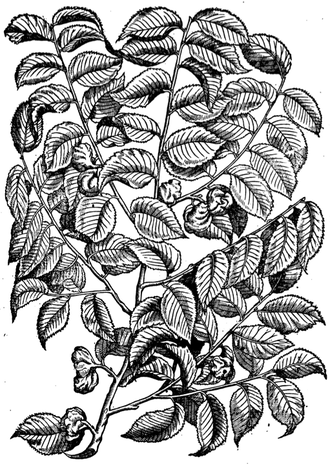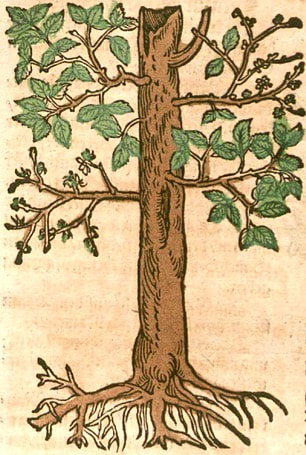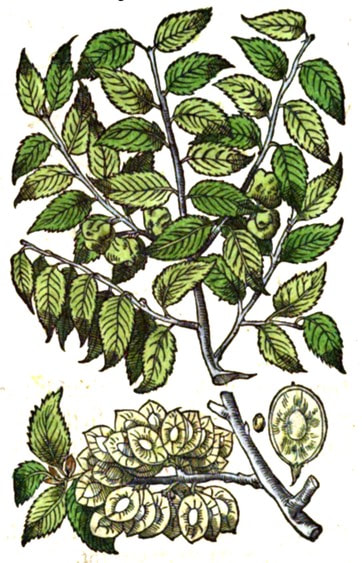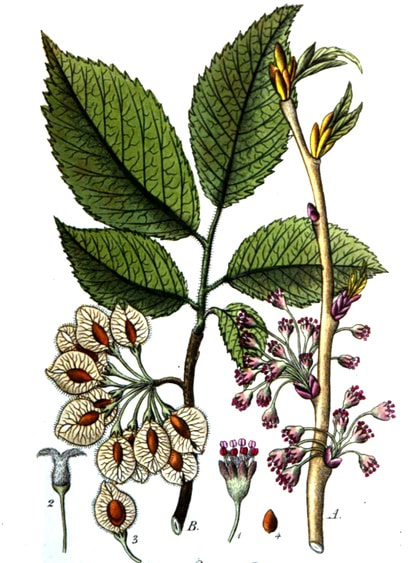Ulmus, Elm tree
Dirdar (Unani)
|
New Kreuterbuch, Matthiolus, 1563
|
Krauterbuch, Lonitzer, 1578
|
Botanical name:
Ulmus spp.;
Traditional varieties include U. procera (English Elm), U. campestris (Wild Elm), U. laevis (syn. U. effusa, the White Elm) and U. montanus (Mountain Elm)
Parts used:
Bark; Leaf
"The Bark and Root have similar properties". (Avicenna)
Temperature & Taste:
Cold (Salmon said Warm), dry.
Ulmus spp.;
Traditional varieties include U. procera (English Elm), U. campestris (Wild Elm), U. laevis (syn. U. effusa, the White Elm) and U. montanus (Mountain Elm)
Parts used:
Bark; Leaf
"The Bark and Root have similar properties". (Avicenna)
Temperature & Taste:
Cold (Salmon said Warm), dry.
Uses:
1. Clears Phlegm:
-decoction of the bark in water and wine cleanses Phlegm; full doses purge Phlegm
2. Clears Wind-Damp, Benefits the Bones and Joints
-Weakness of the Bones, Fractures, tightness of the sinews (mostly externally)
3. Externally:
-as a hip bath for excess Menstruation
-used to cleanse the skin and face in washes
-decoction of the bark or leaf is used topically for Fractures (Lonicerus)
-decoction of the root-bark is applied to Tumors and tightness of the Sinews
-leaf juice applied with vinegar to Dandruff, chronic Eczema, Psoriasis, Leprosy
-"the leaves, barks and buds are suitable for treating abscesses". (Avicenna)
-'the liquor in the Blisters is cosmetic; and takes away Pimples, Spots and Freckles from the Face, and heals green Wounds'. (Salmon)
-liquor found in the leaf bladders is applied to hernias in children. (Culpeper)
-leaf bruised and applied to fresh Wounds
-bark decoction is a good application to burns.
-Baldness and Alopecia: boil Elm roots for a long time in water and collect the fat from the top; apply topically; or a decoction of Elm bark as a wash.
Dose:
Bark in Decoction: 6–18 grams (up to 28 grams was used)
Traditionally, 2 drams–1 oz. of the bark in decoction (wine and water) to be taken over the course of a day; 1 oz. doses are used to purge Phlegm.
Comment:
'The said water [from the bladders in the leaf] put into a glass, and set into the ground, or else in dung for twenty-five days, the mouth being close stopped, and the bottom set upon a lay of ordinary salt, that the feces [sediment] may settle and water become clear, is a singular and sovereign balm for green [fresh] Wounds', (Culpeper)
Substitute:
The Indian Elm Tree, Holoptelea integrifolia (syn. Ulmus integrifolia), has been used similarly.
Bark in Decoction: 6–18 grams (up to 28 grams was used)
Traditionally, 2 drams–1 oz. of the bark in decoction (wine and water) to be taken over the course of a day; 1 oz. doses are used to purge Phlegm.
Comment:
'The said water [from the bladders in the leaf] put into a glass, and set into the ground, or else in dung for twenty-five days, the mouth being close stopped, and the bottom set upon a lay of ordinary salt, that the feces [sediment] may settle and water become clear, is a singular and sovereign balm for green [fresh] Wounds', (Culpeper)
Substitute:
The Indian Elm Tree, Holoptelea integrifolia (syn. Ulmus integrifolia), has been used similarly.
Main Combinations:
1. Diarrhea, Elm bark, Oak bark, Tormentil
2. To cleanse the Blood:
i. Bittersweet with Fumitory, Elm bark, Burdock root, Red Dock root (Formulaire Magistral et Memorial Pharmaceutique, 1823)
ii. Sarsaparilla with Mezereon root, Guaiacum, Yellow Dock, Burdock, Bittersweet, Elm Bark, Elder Flowers, Fumitory, Wood Sanicle (Model Botanic Guide to Health)
3. Hip Bath for excess Menstruation, Elm bark with Alum
Cautions:
None noted
Main Preparations used:
None noted
Main Preparations used:





